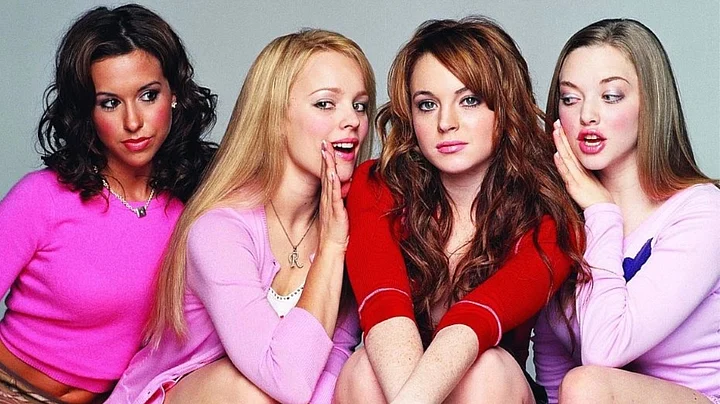“On October 3rd, he asked me what day it was.”
“It’s October 3rd.”
Happy Mean Girls Day! Yes, that’s a thing. No, I am not making this up.
Unless you were living under a rock in early 2000s, you could not have missed Tina Fey and Mark Waters’ Mean Girls (2004), starring Lindsay Lohan. The American teen comedy has become a cult classic for teenagers around the world and the dialogue quoted above has given birth to Mean Girls Day.
For the unaware, Mean Girls is the story of Cady Heron (Lindsay Lohan), a home-schooled teenager who moves from Africa to the United States and joins a high school in order to get ‘socialised’. A trajectory of events leads Cady through the mildly terrifying world of high school; a world built on social hierarchies.
Wait... social hierarchies? In a ‘dumb’ teen ‘chick flick’? Yes, that’s right.
We are often quick to dismiss teen movies as ‘mindless’ but they tell us a lot about society and how it ‘dumbs down’ teenage girls by disregarding what they have to say.
Mean Girls is one such movie. It raises an important question: Does what teenage girls say matter?
Where You Sit in the Cafeteria Is Crucial
The high school cafeteria in Mean Girls is a microcosm of society. The audience is introduced to the various social cliques — each of whom occupies a fixed space in the cafeteria, with no mixing allowed — that form the backbone of social existence in North Shore High School. Janis Ian’s (Lizzy Caplan) map is a handy guide to the same.
Another teen movie that invokes this need to stick to assigned social cliques is High School Musical (2006). The movie, in fact, has a whole song dedicated to maintaining social hierarchies within the space of the high school.
These examples show that high schools are social spaces. It is in high school that most kids begin to develop their sense of identity.
An understanding of where one belongs is part and parcel of becoming a young adult. However, a sense of ‘self’ also comes with a sense of the ‘other’.
In no time, teenagers are initiated into society’s discriminatory politics, all thanks to high school!
‘Girl World’ Had a Lot of Rules
In Mean Girls, when Cady is invited to lunch by The Plastics, North Shore High School’s “teen royalty”, Janice convinces Cady to accept the invitation as a “fun little [social] experiment.” This leads to Cady’s initiation into, what is termed as, the ‘Girl World’: a smaller gendered world within the larger world of high school.
Having lunch with The Plastics was like leaving the actual world and entering ‘Girl World’ and ‘Girl World’ had a lot of rules.Cady Heron
What might be some of the rules of ‘Girl World’? Gretchen Wieners (Lacey Chabert), a member of The Plastics and trusty sidekick to ‘Queen Bee’ Regina George (Rachel McAdams), enumerates them in the movie.
Okay, irregardless, ex-boyfriends are just off-limits to friends. I mean, that’s just, like, the rules of feminism.Gretchen Wieners
Gretchen Wieners and Grammar
Gretchen’s comment (quoted above) says a lot about her character in the movie. Firstly, she uses ‘irregardless’ instead of the word ‘regardless’.
Urban Dictionary defines ‘irregardless’ as “used by uneducated people who ignorantly mean to say regardless.”
Gretchen also uses the discursive ‘like’ and ‘I mean’ (as do we!). That is, the words are not used literally or as functional phrases. Another popular scene in the movie is when Gretchen exclaims, “So fetch!”, where the word ‘fetch’ is used as an adjective.
Gretchen’s ‘ungrammatical’ language usage marks her as a stereotype in the movie. She is what is termed in American popular terminology a ‘valley girl’.
Urban Dictionary defines ‘valley girl’ as “a spoiled, idiotic adolescent female... typically rich and white, whose language is insulting to human intelligence.”
Language, as Deborah Cameron writes, is influenced by one’s social environment. Gretchen’s identity as a ‘valley girl’ is constructed by and reflected in her use of language. This identity also places her at a certain level in the hierarchised ‘Girl World’: she may be teen royalty but she is emphatically the ‘dumb sidekick’.
Does What Teenage Girls Say Matter?
Gretchen is not alone. A number of linguistic trends associated with teenage girls including vocal fry and uptalk are often seen as markers of immaturity and stupidity.
However, Gretchen is not as dumb as she may seem. When Cady is asked, “So, if you’re from Africa, why are you white?”, it is Gretchen who says, “…You can’t just ask people why they’re white.” She clearly displays some awareness of racism. In her speech about Julius Caesar, she angrily asks, “…when did it become okay for one person to be the boss of everybody?”, exhibiting some political perception.
Tagging Gretchen as a ‘valley girl’, then, is a simplification of her character but that is what stereotypes are all about.
It matters what teenage girls like Gretchen say because it reveals how the stereotypical construction of ‘Girl World’, in the movie and in the real world, is dependent on the use of language.
This stereotyping creates a hierarchy between the audience and the characters in the movie where the audience is ‘smarter’ than teenage girls like Gretchen and has the authority to dismiss what they have to say. A similar thing may be observed when it comes to teenage girls and adults in the real world.
So the next time you feel tempted to immediately dismiss a teen movie as mindless or call a teenager dumb, consider that you may have fallen prey to a prejudiced narrative.
